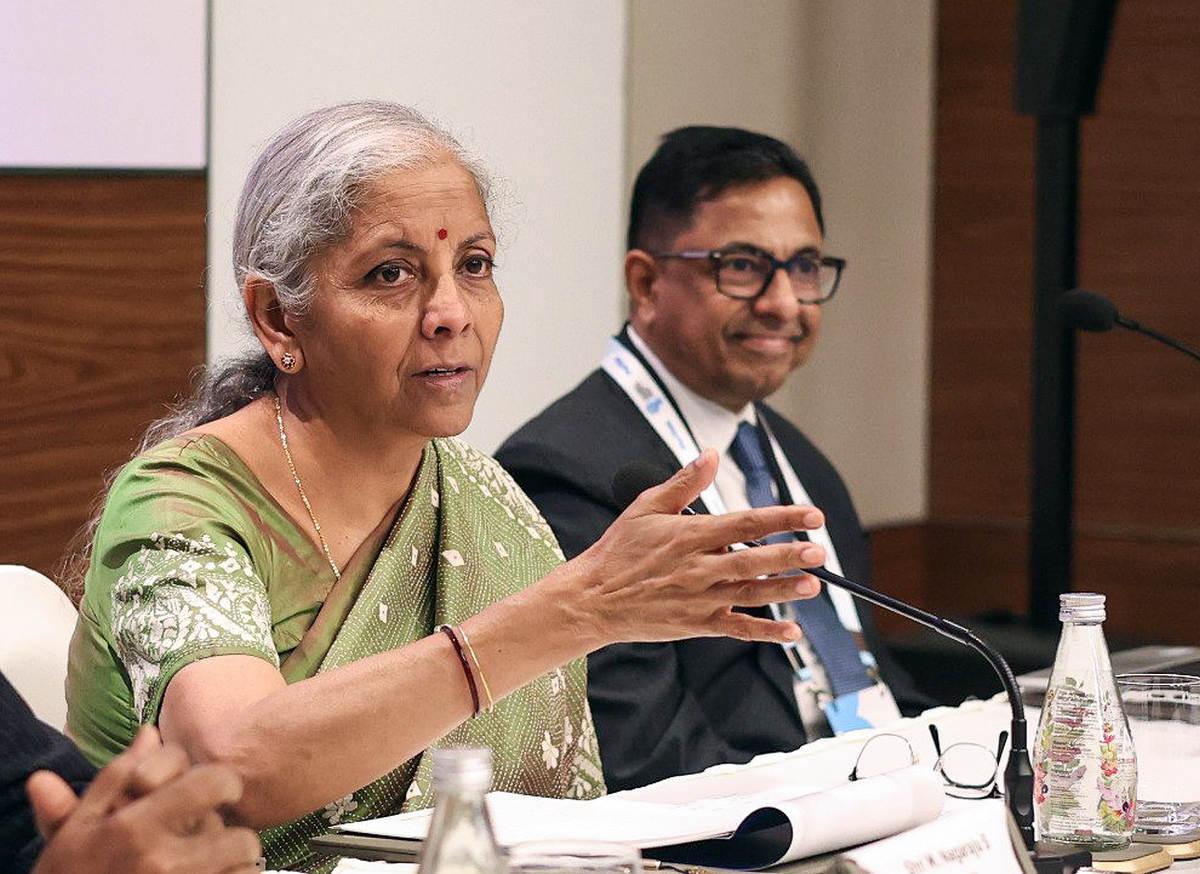Finance Minister Nirmala Sitharaman on Tuesday asked fintech firms to focus on risk management at a time when criminals are using AI to mimic voices, clone identities and create lifelike videos to manipulate people.

Photograph: ANI Photo
Speaking at the 6th edition of Global Fintech Fest 2025 here, the finance minister also said India has the potential of becoming the global hub for building various AI products and services.
During the event, Sitharaman launched the Foreign Currency Settlement System (FCSS) of GIFT IFSC designed to settle transactions in foreign currencies on a real-time or near real-time basis.
With the operationalisation of the FCSS, GIFT IFSC joins a select group of global financial centres – including Hong Kong, Tokyo, and Manila – that have the infrastructure to settle foreign currency transactions locally.
The minister said India can also build AI products that fits diverse use-cases across the world. It can be a laboratory for developing and testing AI ideas.
“Our AI stack must be rooted in Indian languages, local contexts, and multimodal interfaces, so that it can be widely accepted and accessed by our citizens,” she said and added that focused approach across the AI stack can make India the AI torchbearer for the Global South.
She said while artificial intelligence (AI) has transformed finance and governance, there are darker sides of the technology also.
“Even as AI opens extraordinary possibilities, we must confront its darker side.
“The same tools that power innovation can be weaponised for deception and for fraud.
“I’m not personalising it, but I can say, I have seen several deepfake videos of myself being circulated online, manipulated to mislead citizens and distort facts.
“It was a reminder of the urgency with which we must strengthen our defences,” the finance minister said.
The new generation of fraud is no longer about breaching firewalls, it is about hacking trust, Sitharaman said.
Criminals, she added, are using AI to mimic voices, clone identities and create lifelike videos that can manipulate people.
The minister further said fintech in India is not a niche urban convenience, it is a nationwide enabler of economic empowerment.
India’s fintech journey has transformed everyday payments into an invisible and inseparable habit, powered by UPI and digital public infrastructure.
“This is a good moment to reflect on what kind of financial future we wish to build and how do we get there.
“Fintechs must essentially focus on the fundamentals such as revenue growth, innovative product offerings, profitability, risk and compliance capabilities,” she said.
The minister emphasised that responsible regulation is not a brake on progress; it is a seat belt for safe acceleration.
Fintech sector must help cover the small remaining gaps in the financial ecosystem, she added.
In the span of a single decade, India has connected a population equivalent to that of the entire European Union (EU) to the formal banking system, opening over 56 Crore Jan Dhan bank accounts.
India now ranks 3rd in the world in terms of having the number of fintech companies and also leads in digital payment volumes, having processed over 18,580 crore UPI transactions worth Rs 261 lakh crore in 2024-25.
Nearly half the world’s real-time digital transactions happen in India, with adoption rates of 87 per cent compared to a global average of 67 per cent, Sitharaman added.
She said the Government of India has leveraged digitisation by introducing Direct Benefit Transfer (DBT) system for the beneficiaries of all its social welfare schemes, which has significantly boosted welfare efficiency by reducing subsidies and leakages, with savings of Rs 4.31 lakh crore and a 16-fold increase in beneficiary coverage between 2014 and 2024.
Shift from paper-based disbursals to direct digital transfers has ensured that public funds reach the people they are meant for, she added.
The Union minister said given the large population with 650 million smartphone users, the country should create scalable models for sectors beyond finance such as healthcare, education, agriculture, MSMEs, exports, etc.
“India can also build AI products that fit diverse use-cases across the world. It can be a laboratory for developing and testing AI ideas,” she said.
The AI stack must be rooted in Indian languages, local contexts, and multimodal interfaces, so that it can be widely accepted and accessed by our citizens.
Focused approach across the AI stack can make India the AI torchbearer for the Global South, the minister added.
***************************************************************************************
AI making phishing attempts more targeted: CERT-IN chief

Photograph: Daniel Cole/Reuters
Government’s cyber security agency chief Sanjay Bahl on Tuesday warned that artificial intelligence (AI) is making phishing attempts more targeted and the number of cyber-attacks will continue to increase with new technologies coming in.
“The malicious actors are the first ones who start using technology. And if you see the phishing attacks, they are very much being used with AI,” Bahl, who is the director general at CERT-IN (Central Emergency Response Team), said at a session at the Global Fintech Festival 2025.
“So earlier, you could make out that this is a phishing email. Those who were reasonably attentive and had some idea that this is how phishing happens.
“But today, even they are being fooled because the AI is making it (the attack) so perfect that you cannot figure out whether this is a phishing email or not,” he said.
He said that during Operation Sindoor, there were “coordinated attacks” in terms of misinformation, disinformation, website defacements, phishing attacks, among others, and all such attempts were thwarted.
“There was nothing which went through, there was no material damage to anything, there were no cascade impacts,” Bahl said, adding that this was achieved due to years of preparation and capability building, among others.
The within-six-hour reporting really helped, so that in case someone saw something suspicious, they reported to CERT, and we were able to immediately look at what’s happening and also alert others, he said.
“Obviously, we were looking at 24×7 monitoring, and any change in the baselines, we were able to alert the entities… So there was a lot of preparedness in terms of drills that we were conducting,” Bahl added.
***************************************************************************************
IFSCA to roll out guidelines for video-based KYC for NRI customers by November

IMAGE: Kindly note the image has been posted only for representational purposes. Photograph: Kind courtesy F1 Digitals/Pixabay.com
The International Financial Services Centres Authority (IFSCA) will issue guidelines on video-based KYC for onboarding Non-Resident Indian (NRI) customers by November, IFSCA chairman K. Rajaraman said on Tuesday.
Speaking at the sixth edition of the Global Fintech Fest 2025, Rajaraman said that over the next few months, the focus will be on streamlining the KYC process, following directions from Finance Minister Nirmala Sitharaman, who chairs the Financial Stability and Development Council, to make KYC more efficient and flexible.
“A consultation paper on video KYC was released a few months ago and now we are likely to notify (guidelines) by, say, by November, which means that now paper-based applications for opening a deposit account or an investment account and gift would not be required,” he said in Mumbai.
Rajaraman also said that IFSCA is collaborating with the Unique Identification Authority of India (UIDAI) and the Reserve Bank of India (RBI) to introduce a faceless authentication system.
UIDAI has already implemented this system domestically, and IFSCA aims to extend similar capabilities to non-resident Indians (NRIs) abroad, enabling them to onboard seamlessly from locations such as San Francisco or Dubai.
“If we can implement this (faceless authentication system) within the next three to four months, NRIs will find it much easier to open accounts, invest, and transact through GIFT City in a fully digital, unassisted manner,” Rajaraman said, adding that addressing the KYC challenge remains our top priority in the coming months.
IFSCA is a unified authority for the development and regulation of financial products, financial services and financial institutions in the International Financial Services Centres.
On the newly launched foreign currency settlement system, Rajaraman said it will enable real-time settlements, improve liquidity management, and ensure regulatory compliance.
Earlier in the day, Finance Minister Nirmala Sitharaman officially launched the foreign currency settlement system at GIFT IFSC. Currently, foreign currency transactions are typically settled with a delay of 36 to 48 hours.
***************************************************************************************
Paytm chief Sharma says the fintech did not inspire demonetisation

Photograph: Shailesh Andrade/Reuters
Paytm founder and Chief Executive Vijay Shekhar Sharma said that the fintech did not inspire the demonetization decision in 2016, and added that if it had such heft, it would not be suffering the way it is today.
Speaking at the annual Global Fintech Fest in Mumbai, Sharma also spoke strongly in support of sovereignty in the artificial intelligence arena and added that he is starting AI-focused offerings now.
While explaining the company’s roots in the payments business and the journey till now, Sharma made the remarks about the government’s demonetisation decision, when high-value notes ceased to be legal tender overnight, giving a thrust to the digital payments alternatives.
“In November 2016, when something happened (demonetisation), people felt we inspired it. But, if we had such heft (aukaat), then we wouldn’t be suffering the way we are today,” Sharma said.
In the last few years, Paytm has been under the regulatory glare, including facing action from both the Reserve Bank and also the capital markets regulator Sebi, for a variety of alleged lapses.
When asked about what is next for him, Sharma spoke about AI ambitions, tying it up with what should be the country’s aspirations.
Sharma said Paytm as a brand is associated with payments technologies and financial services, and hence, he will be adopting a newer brand identity for the AI services.
Without specifying the exact services which he has in mind, Sharma said he is “uncomforted” by the lack of work on AI in India.
“For India, the sovereignty of AI is equal to virginity in a way. India should not give in to the sovereignty of AI to the foreign world at all. It is my belief that we as a country are capable and will build it,” he said.
The country has relied on operating systems made in the US throughout its technological evolution, he said, pointing to its reliance on American platforms for running computers, cloud networks, and mobile phones.
Admiring the work done by China, he said the country’s northern neighbour has built their own rockets, and also said that a mobile phone company built its own operating system when a US company disallowed it from using its wares.
Meanwhile, in an earlier session at the same event, Sharma also stressed on startup founders exercising their control over initial public offer pricing and not depending on any external stakeholders on the same.
***************************************************************************************
NPCI launches slew of UPI-focused products

Illustration: Dominic Xavier/Rediff
The National Payments Corporation of India (NPCI) on Tuesday launched a slew of initiatives centred around its flagship unified payments interface (UPI), including an on-device biometric authentication.
Apart from this, it also launched an Aadhaar-based Face Authentication in UPI to enable Aadhaar-linked biometric authentication for setting or resetting UPI PIN.
In addition, it launched a new mode for Cash Withdrawal through Micro ATMs using UPI at UPI Cash Points which are run by business correspondents, as per an official statement.
Department of Financial Services (DFS) secretary M Nagaraju launched a majority of the products at the annual Global Fintech Fest in Mumbai.
The On-Device Authentication for UPI, enables customers to authenticate UPI payments directly through their smartphone’s built-in security options such as fingerprint or face unlock as an alternative to manually entering the UPI PIN, an official statement said.
The facility will be made available to customers who choose to opt in, giving them control over their preferred mode of authentication, it said.
Global payments major Paypal also announced a tie-up with NPCI arm NPCI International Payments to integrate UPI on Paypal World, a global platform expected to launch in 2025.
The NPCI arm becomes the first entity globally to partner with the nearly 25-year-old PayPal’s new service, which will help Indians using UPI make payments to foreign merchants in Indian rupees.
Paypal solves the complexity of cross-border commerce with a cloud native, multi-region deployment architecture that ensures low latency and high availability worldwide, an official statement said.
Apart from these, Reserve Bank Deputy Governor T Rabi Sankar also launched several products at the same event, including an initiative that allows joint account holders and multi-signatory account holders to use UPI for payments.
The DG also launched small-value transactions using wearable glasses via UPI Lite, as well as forex on Bharat Connect.




